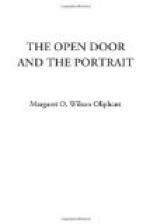the laws of sound to any great extent, and there’s
a great deal in ventriloquism that we don’t
know much about.” “If it’s the
same to you,” I said, “I wish you’d
keep all that to yourself, Simson. It doesn’t
suit my state of mind.” “Oh, I hope
I know how to respect idiosyncrasy,” he said.
The very tone of his voice irritated me beyond measure.
These scientific fellows, I wonder people put up with
them as they do, when you have no mind for their cold-blooded
confidence. Dr. Moncrieff met us about eleven
o’clock, the same time as on the previous night.
He was a large man, with a venerable countenance and
white hair,—old, but in full vigor, and
thinking less of a cold night walk than many a younger
man. He had his lantern, as I had. We were
fully provided with means of lighting the place, and
we were all of us resolute men. We had a rapid
consultation as we went up, and the result was that
we divided to different posts. Dr. Moncrieff remained
inside the wall—if you can call that inside
where there was no wall but one. Simson placed
himself on the side next the ruins, so as to intercept
any communication with the old house, which was what
his mind was fixed upon. I was posted on the
other side. To say that nothing could come near
without being seen was self-evident. It had been
so also on the previous night. Now, with our
three lights in the midst of the darkness, the whole
place seemed illuminated. Dr. Moncrieff’s
lantern, which was a large one, without any means
of shutting up,—an old-fashioned lantern
with a pierced and ornamental top,—shone
steadily, the rays shooting out of it upward into
the gloom. He placed it on the grass, where the
middle of the room, if this had been a room, would
have been. The usual effect of the light streaming
out of the door-way was prevented by the illumination
which Simson and I on either side supplied. With
these differences, everything seemed as on the previous
night.
And what occurred was exactly the same, with the same
air of repetition, point for point, as I had formerly
remarked. I declare that it seemed to me as if
I were pushed against, put aside, by the owner of the
voice as he paced up and down in his trouble,—though
these are perfectly futile words, seeing that the
stream of light from my lantern, and that from Simson’s
taper, lay broad and clear, without a shadow, without
the smallest break, across the entire breadth of the
grass. I had ceased even to be alarmed, for my
part. My heart was rent with pity and trouble,—pity
for the poor suffering human creature that moaned and
pleaded so, and trouble for myself and my boy.
God! if I could not find any help,—and
what help could I find?—Roland would die.




